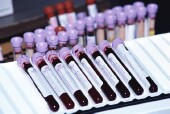- Could Artificial Sweeteners Be Aging the Brain Faster?
- Techniques for Soothing Your Nervous System
- Does the Water in Your House Smell Funny? Here’s Why
- Can a Daily Dose of Apple Cider Vinegar Actually Aid Weight Loss?
- 6 Health Beverages That Can Actually Spike Your Blood Sugar
- Treatment Options for Social Anxiety Disorder
- Understanding the Connection Between Anxiety and Depression
- How Daily Prunes Can Influence Cholesterol and Inflammation
- When to Take B12 for Better Absorption and Energy
- Epsom Salts: Health Benefits and Uses
Blood Protein May Spot Pancreatic Cancer Early


Researchers have discovered a protein that pancreatic tumors consistently shed into the blood, making a potentially significant advance toward a blood test that could catch the deadly cancer early.
Experts were cautiously optimistic about the findings, published online June 24 in the journal Nature.
More research is needed to make sure any blood test based on results is useful. And it’s expected that it would first be used to monitor patients who have been treated for pancreatic cancer, said senior researcher Dr. Raghu Kalluri.
But the hope is that it can eventually enable early diagnosis.
That’s the “holy grail” in pancreatic cancer research, said Kalluri, chair of cancer biology at M.D. Anderson Cancer Center in Houston.
Few people now survive pancreatic cancer because it’s rarely caught early, when it can be cured with surgery. The symptoms, which include weight loss and jaundice, usually arise only after the disease has spread, he said.
Of all Americans diagnosed with pancreatic cancer, only 7 percent are still alive five years later, the National Cancer Institute says.
Scientists have tried, without great success, to find markers, or indicators, for pancreatic cancer — proteins in the blood that consistently and specifically signal the presence of the disease.
The marker that Kalluri’s team found appears to be better than any others studied so far, said Dr. Kenneth Yu, an oncologist who was not involved in the research.
“This is really impressive,” said Yu, who treats and studies pancreatic cancer at Memorial Sloan-Kettering Cancer Center in New York City. “You rarely see something with 100 percent sensitivity and specificity.”
Yu was referring to the fact that all pancreatic tumors analyzed in the study, from almost 250 patients, secreted high amounts of the marker — a protein called GPC1. Just as important, the protein was not released at high levels from noncancerous cells.
For any blood test to be useful in the real world, Yu said, it has to reliably detect pancreatic tumors and also have a very low rate of “false positives.”
Kalluri said his team did not actually set out to find an indicator for pancreatic cancer. They were interested in exosomes, which are tiny capsules secreted by all cells — healthy and otherwise — that contain DNA and other genetic material.
The researchers wanted to see if they could distinguish exosomes released by cancer cells from those secreted by noncancerous cells. So they analyzed blood samples from about 250 pancreatic cancer patients and 32 breast cancer patients. For comparison, they used blood samples from healthy donors and small groups of people with other conditions, such as pancreatitis (chronic inflammation of the pancreas).
They found that exosomes from cancer cells, but not other cell types, harbored high levels of the GPC1 protein.
“Any time we identified GPC1-enriched exosomes, we could tell it was a cancer cell,” Kalluri said.
And while many breast tumors released high amounts of GPC1, all pancreatic tumors did — including early stage cancers.
For reasons that aren’t clear, Kalluri said, pancreatic tumors seem to be “really good” at secreting GPC1.
Still, the fact that other cancers also release high amounts of the protein presents a potential obstacle, Yu said.
“It’s not specific to pancreatic cancer,” he said. “So that needs to be figured out. Is there a way to refine this to detect pancreatic cancer?”
And if such a test becomes available, who would be screened?
“That’s a good question,” Yu said. One approach, he noted, could be to screen only people with a high risk of pancreatic cancer — such as families affected by an inherited form of the cancer.
But smokers and obese people also have a raised risk of pancreatic cancer, Kalluri noted.
He said those people could potentially be candidates for a GPC1 blood test. If it’s positive, they could have an MRI or CT scan to get images of the pancreas.
And even though pancreatic cancer is not that common, Yu said it’s possible that a blood test — if it’s good enough and cost-effective — could be used to screen the general population.
Kalluri said the technology needed to measure GPC1 is “pretty low-end,” and he did not expect it to be prohibitively expensive.
However, Yu noted, if genetic analysis were required to detect pancreatic cancer, specifically, that would be more complex and expensive.
More information
The American Cancer Society has a primer on pancreatic cancer.
Source: HealthDay
Copyright © 2026 HealthDay. All rights reserved.










